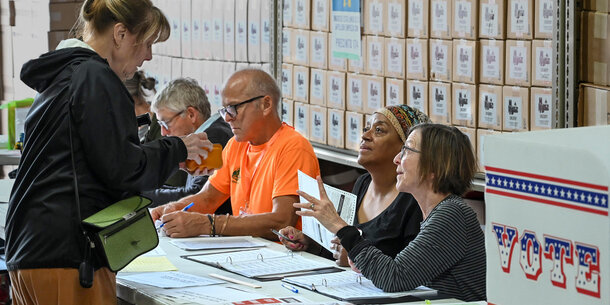Suscríbete aquí al boletín informativo del Brennan Center en español
Actualización del 10 de octubre de 2024: A medida que el huracán Milton se aleja de la costa de Florida y el alcance de su destrucción se hace evidente, este estado, al igual que Carolina del Norte, enfrentará retos que pueden afectar su operatividad electoral.
A menos de dos semanas de que el huracán Helene devastara el oeste de Carolina del Norte, los funcionarios estatales deben ser elogiados por sus acciones rápidas y bipartidistas para mitigar el impacto de la tormenta en sus procesos electorales.
Las evaluaciones inmediatas de la infraestructura electoral en el oeste de Carolina del Norte fueron terribles: el cierre de las oficinas electorales del condado, la pérdida de probablemente cientos, si no miles, de boletas de votación en ausencia, la destrucción de recintos de votación temprana y de sitios de votación, y la probable indisponibilidad laboral de muchos trabajadores electorales del condado.
A pesar de estos enormes desafíos, los funcionarios de Carolina del Norte atendieron la petición de los funcionarios electorales y electos, activistas prodemocracia y campañas políticas (la campaña Trump-Vance abogó para que los funcionarios estatales de Carolina del Norte “promulgaran rápidamente una expansión del acceso al voto para los residentes del estado que viven en áreas afectadas por el huracán Helene”) y tomaron pasos medidas decisivas para prevenir la interrupción de las próximas elecciones.
El 7 de octubre, la Junta Estatal de Elecciones adoptó de forma bipartidista una resolución con ocho medidas para ayudar a las personas votantes y a los funcionarios electorales en los 13 condados del oeste de Carolina del Norte. Dos días después, la legislatura estatal aprobó una propuesta bipartidista que no solo codifica las medidas de la junta, sino que expande su aplicación a otros 12 condados más. La propuesta, que se espera sea firmada por el gobernador Roy Cooper de Carolina del Norte, también incluye $5 millones en fondos de emergencia para la Junta de Estatal de Elecciones.
En los próximos días, funcionarios federales, estatales y municipales en Florida tendrán, sin dudas, se centrarán principalmente en la seguridad de la ciudadanía en su camino hacia la recuperación. Estos esfuerzos de recuperación también deberán incluir la protección de la capacidad de votar de sus ciudadanos.
Florida debe seguir el ejemplo de Carolina del Norte y proteger las opciones de votación por correo y en persona para su ciudadanía, y proporcionar a los funcionarios electorales las políticas públicas y el financiamiento necesarios para administrar imparcialmente y de forma segura las elecciones generales de 2024.
La región sudeste del país aún se tambalea tras el huracán Helene. Más de 190 personas murieron y muchas siguen desaparecidas. Ha sido particularmente desastroso para la parte oeste de Carolina del Norte, donde la tormenta produjo inundaciones catastróficas que han dejado a muchos pueblitos de la región Apalache aislados del exterior. Muchos residentes todavía no tienen acceso a agua, electricidad ni internet.
Helene también se produjo durante una temporada electoral muy reñida. Si bien todavía falta un mes para el día de las elecciones, enfocarse en el 5 de noviembre le resta atención al proceso electoral en Carolina del Norte. Para la mañana del 3 de octubre, los votantes del estado ya habían solicitado más de un cuarto de millón de boletas para votar por correo. De ellas, 40,000 se solicitaron en uno de los 25 condados que el gobierno federal ha designado como zonas afectadas por la catástrofe. Falta una semana para el plazo de inscripción de votantes en Carolina del Norte y la votación anticipada en persona empezará en apenas dos semanas. En resumidas cuentas, las elecciones ya están en marcha en Carolina del Norte.
Nunca es fácil administrar elecciones y hacerlo bajo condiciones de emergencia es particularmente difícil. Varias oficinas electorales en los condados afectados en Carolina del Norte actualmente se esfuerzan por reabrir. Es probable que los funcionarios de las oficinas cerradas no puedan realizar importantes labores electorales como procesar solicitudes de inscripción o de boletas de votación en ausencia, probar el equipo para votar ni capacitar a trabajadores electorales. Es más, muchos de los trabajadores electorales probablemente enfrenten dificultades debido a la tormenta.
El impacto en la administración de las elecciones es incluso más complicado dada la magnitud de la desolación causada por la tormenta. Se han derrumbado viviendas y otros edificios, dejando sin techo a los votantes de muchos lugares y posiblemente varios puntos de votación anticipada o recintos electorales se desmoronaron. Es posible que también se hayan dañado o destruido buzones y oficinas de correo, y que esto haya hecho que se pierdan boletas de votación en ausencia que entraban y salían. No es posible transitar por muchas carreteras y puentes, lo que dificulta el acceso para los votantes y funcionarios electorales a las oficinas electorales y a los recintos electorales, incluso si el local en sí está intacto.
A menudo se realizan elecciones federales y estatales durante la temporada de huracanes. Ya que el cambio climático sigue haciendo que tormentas de este tipo sean más comunes, continuaremos viendo complicaciones en elecciones futuras. Nos complace ver que Carolina del Norte toma medidas para asegurar que las elecciones se realicen de la mejor manera posible. Dicho eso, el gobierno estatal y federal debe tomar medidas decisivas y rápidas a fin de asegurar que 1.3 millones de votantes inscritos en la zona estatal de la catástrofe tengan acceso a comicios seguros y accesibles, y que los funcionarios estatales y municipales electorales tengan los recursos para ayudar a dichos votantes.
Coordinar a nivel federal, estatal y local para evaluar necesidades y proporcionar fondos
Es comprensible que durante una catástrofe natural e inmediatamente después, los funcionarios estatales y federales se enfoquen en proteger y salvar vidas. Pero cuando hay elecciones inminentes, estos muy pronto deben dar prioridad a la administración de las elecciones. Los funcionarios federales, estatales y locales deben coordinar la evaluación del impacto de la tormenta en el personal y la infraestructura local. Luego deben identificar y prestar el apoyo, los recursos y los fondos necesarios para garantizar que la capacidad de los votantes de participar en el proceso electoral no se haya reducido, y que la seguridad e integridad de ese proceso no se haya puesto en peligro.
Evaluar, comunicar e implementar la continuidad de planes de operación
Los funcionarios federales, estatales y municipales deben hacer uso de sus diversos recursos para determinar la seguridad y el bienestar del personal electoral clave y el grado de daño a las oficinas, las instalaciones con equipos electoras y los recintos de votación. Los funcionarios estatales y locales necesitarán de la participación de los encargados de atender las emergencias de todos los niveles del gobierno. Es necesario proteger recursos cruciales y materiales relacionados con las elecciones. Los empleados clave necesitarán asistencia para cumplir con sus importantes funciones electorales de manera rápida y segura. Deben coordinar con otras agencias que respaldan los diversos aspectos de la administración de las elecciones, como el Departamento de Seguridad Nacional, el Servicio Postal de EE. UU. o incluso el Departamento de Justicia del gobierno federal.
De igual manera, los agentes de la ley a nivel estatal y local, el personal de informática o incluso de asignación de recursos deben estar disponibles para escuchar las inquietudes y necesidades de los funcionarios electorales y apoyarlos. Este diálogo libre y de colaboración entre los funcionarios electorales y sus colegas en el gobierno es crucial para la seguridad del proceso de votación. A fin de cuentas, los objetivos principales son asegurar que no se prive a las personas de su derecho al voto y que se administren las elecciones de manera segura e imparcial.
Proporcionar fondos de emergencia
El gobierno federal designa las elecciones como infraestructura esencial. De todos modos, la Agencia Federal para el Manejo de Emergencias (FEMA, por sus siglas en inglés) no asignó fondos a los administradores de elecciones tras el huracán Michael en 2018. Es imprescindible que el gobierno federal aporte recursos para ayudar a que las elecciones se realicen sin problemas en Carolina del Norte. De igual manera, la legislatura estatal debe financiar estas operaciones electorales de emergencia. Por más que los gobiernos estatales y federales tengan muchas obligaciones financieras por causa de Helene, deben proporcionar fondos para las elecciones.
Maximizar las opciones de votación en persona
La flexibilidad es muy importante en una situación de emergencia. Los votantes deben tener opciones para votar para que puedan escoger la opción más segura. Así como aumentar el acceso a la votación por correo a la vez que se conservó la opción de votar en persona fue lo correcto durante la pandemia, ofrecer opciones flexibles para votar en persona y mantener la opción de hacerlo por correo será importante para Carolina del Norte.
Nuestra investigación muestra que cuando los funcionarios electorales pueden mantener la accesibilidad de los recintos electorales, los votantes encuentran la manera de participar. Estudiamos los efectos del huracán Michael en 2018 en la región noroccidente de Florida. Ese año, el gobernador emitió un decreto ejecutivo que permitió que los administradores de elecciones locales cierren algunos recintos e hizo ciertas restricciones sobre la votación por correo menos rigurosas. Sin embargo, los condados no recibieron fondos de emergencia de las agencias estatales para montar urnas de emergencia y, sin ese apoyo, no tuvieron otra opción que cerrar muchos recintos en toda la región. Y en los casos en que se cerraron esos recintos, la participación de los votantes disminuyó muchísimo. Sin embargo, cuando los funcionarios pudieron mantener abiertos los recintos, la participación se redujo mínimamente. Si usar un recinto electoral consolidado es la opción más viable, se deben ofrecer las opciones de trasporte gratuito y accesible a los votantes para minimizar la carga de trasladarse a urnas mucho más lejanas.
Montar recintos electorales de emergencia
El estado debe ayudar a los funcionarios electorales a nivel local a mantener, en la medida posible, la configuración histórica de los recintos. Las personas se acostumbran a votar en el mismo lugar, y es crucial encontrar maneras creativas de asegurar que la votación sea lo más normal posible. Después del huracán Sandy en 2012, Nueva York y Nueva Jersey erigieron urnas “móviles” en casa rodantes, tractocamiones y carpas. De igual manera, durante la pandemia del COVID 19 muchos funcionarios electorales en todo el país montaron opciones para votar al aire libre. Esto exigirá recursos del gobierno estatal o federal.
Combinar varios recintos electorales
Ya que algunos lugares están demasiado dañados como para permitir el traslado seguro a los recintos usuales, quizá sea recomendable combinar los recintos de dos o más distritos electorales en un recinto consolidado en un lugar seguro.
Suspender las leyes de identificación de votantes
En Carolina del Norte, no se exige que los votantes presenten identificación con foto para votar si se ha producido una situación de emergencia a 100 días de la declaración de desastre. Si la vivienda de un votante fue dañada o destruida, es muy posible que haya perdido sus documentos. Otros estados deben considerar adoptar esta excelente medida en situaciones de emergencia. La Junta Estatal de Elecciones de Carolina del Norte debe asegurar que los condados afectados tengan a la mano muchos formularios de exención de identificación de votantes para la votación anticipada y el 5 de noviembre. También deben ofrecer orientación sobre cómo evitar que el alto tráfico resulte en largas filas en caso de que muchos votantes tengan que usar esta exención.
Preservar las opciones de la votación por correo
La votación por correo seguirá siendo importante para las víctimas del desastre en Carolina del Norte. Muchos de estos votantes están en condición de desplazados y quizá no tengan la opción de volver a su casa de inmediato. Tal vez estén viviendo temporalmente en otra parte de su condado, en otra parte de Carolina del Norte o incluso fuera del estado. Como con la votación en persona, los funcionarios estatales tendrán que ofrecer opciones flexibles.
Prolongar el plazo para recibir boletas
En muchos estados, entre ellos Carolina del Norte, las boletas por correo se deben recibir el día de las elecciones, a más tardar, para que cuenten. Sin embargo, tras una catástrofe, con frecuencia el correo se ve muy afectado. Con la propuesta 747 del Senado, la legislatura de Carolina del Norte eliminó el periodo de gracia de 3 días para recibir las boletas de votación en ausencia. Antes del cambio, toda boleta que recibía la junta electoral de los condados hasta tres días después de las elecciones se contaba siempre que se hubiera timbrado el sobre de devolución con la fecha del día de las elecciones, a más tardar. Es posible que se hayan perdido con la devastación aproximadamente 40,000 boletas de votación en ausencia enviadas a votantes antes de la tormenta. Muchos de estos votantes en ausencia son víctimas del desastre y necesitarán tiempo para escoger su mejor opción para votar en estas elecciones. Quizá a fin de cuentas soliciten una boleta de remplazo y, si sus circunstancias particulares y terribles exigen que tomen esta decisión a poco tiempo de las elecciones, necesitarán suficiente tiempo para recibir y devolver su boleta marcada. La junta electoral del estado debe colaborar con la legislatura para volver a instituir temporalmente el periodo de gracia de 3 días en los condados afectados.
Instalar buzones de devolución de boletas de votación en ausencia
La legislatura de Carolina del Norte debe aprobar el uso de buzones de devolución de boletas. En este momento, 27 estados permiten buzones designados para que los votantes que usan las opciones de votación por correo dejen las boletas. Estos estados han notado que el uso de buzones es seguro y una manera confiable de devolver una boleta cuando la jurisdicción electoral adopta rigurosos protocolos de seguridad contra el fraude. Los buzones seguros se pueden colocar en los locales de votación anticipada, instalaciones públicas que todavía operan y a las que los votantes tienen acceso, centros de operaciones de emergencia o incluso en los recintos electorales el día de las elecciones.
Dotación de personal y pedagogía para los votantes
Asegurar una adecuada cantidad de trabajadores electorales
Las elecciones se ejecutan gracias a los trabajadores electorales voluntarios. Si bien a veces se les paga a los trabajadores electorales por sus servicios, con frecuencia el pago es bajo y se puede describir mejor como un gesto de agradecimiento. Muchas de las personas que se han ofrecido como trabajadores electorales voluntarios anteriormente quizá no puedan hacerlo este año. Es posible que el estado necesite intervenir y ofrecer un salario más alto para animar a las personas nuevas a ser trabajadores electorales tras la emergencia. Además, el estado quizá deba permitir que los residentes de condados no afectados por el desastre se desempeñen como trabajadores electorales en un condado donde no viven.
Comunicar cambios extensamente y por muchos y diversos medios
Se debe comunicar a los votantes cualquier cambio a los procedimientos de votación, ya sea sobre la ubicación de los recintos, las reglas de votación por correo o de cualquier otro tipo. Los votantes reciben información sobre los comicios de una variedad de fuentes: noticieros locales por televisión, redes sociales, medios de noticias en internet y otros. Los funcionarios locales electorales deben colaborar con los medios y organizaciones externas para asegurarse de que los votantes se enteren de estos cambios.
La desolación producida por el huracán Helene es profunda y ha dejado atrás viviendas destrozadas, muertes y comunidades afectadas. Sin embargo, en plena conmoción, es imprescindible asegurar que todo ciudadano pueda ejercer su derecho fundamental al voto. No es un asunto que los partidos deben debatir sino un imperativo constitucional. La protección de la democracia exige coordinación inmediata a nivel estatal, federal y municipal, fondos de emergencia para restaurar las opciones de votar por correo y en persona, y la flexibilidad para evitar que se prive de su derecho a los más afectados por la tormenta. Exige medidas rápidas y bipartidistas para garantizar que se administren las elecciones de manera imparcial, segura y sin dejar cicatrices más profundas que las ya dejadas por el desastre.
Traducción de Keynotes Translations and Editorial Services




